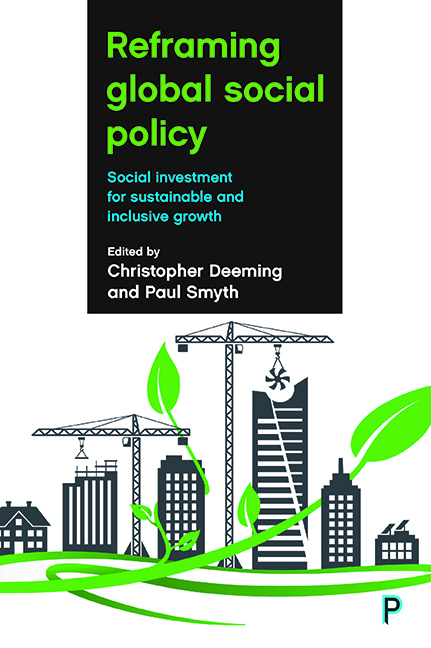Fourteen - Conclusion: towards a new global social policy framework?
Published online by Cambridge University Press: 12 April 2022
Summary
Introduction
The origin of this book was our sense of a growing convergence between the leading edge social policy agenda of social investment and the development policy agenda of inclusive growth, especially among international organisations. This sense of convergence has been magnified hugely by the 2015 launch of the UN's 2030 Agenda on Sustainable Development which, as Koehler (2016) observes, was conceptualised as ‘universal, in the sense of being applicable to all countries’ meaning that ‘the decades-old dichotomy of “developed” versus “under-developed” is cast aside’. As our contributed chapters suggest, the impetus for a new ‘universal’ whole world approach to social policy has come very much from the developing countries. There, often stellar growth rates have been accompanied by that explosion of social policy initiatives associated with inclusive growth; while in much of the OECD, the prospects for welfare reform through social investment remain constrained by austerity economics. But in spite of their very different origins and current policy challenges our volume concludes that social investment and inclusive growth do provide two key conceptual stepping stones towards a new universal global social policy framework in the making.
From the outset we observe just how relatively recent and dynamic has been the development of the two policy approaches. As Anton Hemrijck reminds us in Chapter Two, at the turn of the century social investment was little more than a ‘metaphorical’ gesture towards the productive value of social policy while by now it has become a systematic and fundamental rethink of the role of social policy in responding to the new social risks of the 21st century through social investment in human capital ‘stocks’ and ‘flows’, with the ‘buffers’ of social security. It has quite radically refocused policy attention away from a too exclusive emphasis on the role of taxes and transfers in moderating market inequalities to a focus on the role of social investment and services generally in enabling citizens to realise their capabilities amid the various ‘transitions’ encountered across the life course, described by Jon Kvist in Chapter Nine.
- Type
- Chapter
- Information
- Reframing Global Social PolicySocial Investment for Sustainable and Inclusive Growth, pp. 323 - 342Publisher: Bristol University PressPrint publication year: 2017

